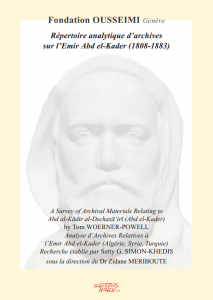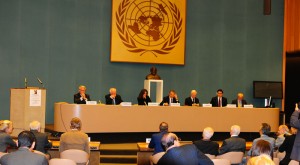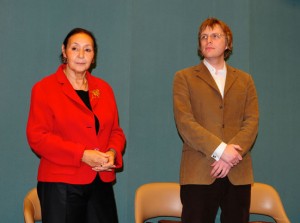Third Ousseimi Foundation Prize for Tolerance awarded posthumously to the Emir Abd El-Kader
On November 4, 2011, at the Palais des Nations in Geneva, the third Ousseimi Foundation Prize for Tolerance was awarded to the Emir Abd El-Kader:
Address by Mr Jacques MOREILLON
When, at the beginning of this century, our Foundation decided to develop its activity in favour of a more tolerant world, it began by adopting a definition of tolerance:
“Tolerance is both a state of mind and an attitude. It is truly meaningful only if tested in daily contact with others.
Tolerance is more than peace (especially if the latter is defined as the “absence of war”): it implies acceptance of others, no matter how different, and recognition that they are equal in rights and liberties, no matter what their sex, race, ethnic group, religion or opinions may be. Tolerance means overcoming mistrust, fear and prejudice, but also indifference, in order to open up to others and live not necessarily as them but with them.
The very concept of tolerance posits the existence of minimum values shared by all men – a kind of common set of rules of the game or universal normative framework, such as that set out in the Universal Declaration of Human Rights – and recognition of the fact that, in respecting others, we all expect to be recognised and respected in turn.
On this basis, the Ousseimi Foundation decided, on one hand, to support projects that it believed contributed to making this definition a reality and, on the other, to bring public and concrete recognition to people and institutions who had actively worked for a more tolerant world. The recipient of the first Ousseimi Foundation Prize for Tolerance was an easy choice. It seemed an obvious fit because of the personality of Nelson Mandela, an exceptional man who not only led his country to democracy, but who also managed to spare it from chaos and violence thanks to his extraordinary aptitude for tolerance and forgiveness. We presented him with the prize in April 2004. And yet this first choice of prize left us with a problem: after Mandela, who? We could only go down a notch! For this reason, we decided to award the prize not to a person but to an event, namely the Fès Festival of World Sacred Music, whose activity, we felt, was strongly symbolic. Indeed, when so many wars and conflicts derive from religious differences, we felt that to bring together sacred music of different religions constituted a strongly symbolic act of tolerance. That prize was awarded in 2006.
Then there was the question of our third prize. What if, rather than honouring a living person, we were to recognize the merit of a model from the past with continuing value for today? The rescue of the Christians of Damascus by Emir Abd El-Kader-al-Jazairy in 1860 presented us in 2010 with the opportunity of celebrating a 150th anniversary. Moreover the whole life and actions of this man provided our age with an example worthy to be emphasized and followed, for 1860 was for the Emir but the summit of a long life of open mindedness and tolerance. A full 20 years before Henry Dunant and the first Geneva Convention, he entrusted to his own mother the protection of enemy prisoners of war and laid down strict rules for their protection and treatment. Abd-el-Kader, a faithful and committed Muslim, encouraged the Jews to attend their synagogue and the Christians to attend their church, since all that counted was not to forget God.
What better model to propose to our age, in which so many manifestations of extremism wear a religious mask to conceal their political motivation?
Thus it was that in 2010 we decided on the posthumous award of the Ousseimi Foundation Prize for Tolerance to the Emir Abd El-Kader.
But the question remained as to what to do with the prize money. We noted that there were numerous sources relating to Abd El-Kader that had not been catalogued. Ignorance is the main ally of intolerance. The Emir had to be better known, the hidden sources needed to be released and brought to the knowledge of all.
Consequently, we launched a competition for institutions and individuals interested in conducting such research. With the assistance of a specialist in Islamic religious issues, we selected the two people whose experience and knowledge and whose replies to our questions best qualified them to devote the CHF 60,000 prize monies to research that would complement the list of available sources on Abd El-Kader, to share it with the academic community and, ultimately, with the world: Doctor Tom Woerner-Powell and Madam Geneviève Sethi-Simon, from whom you will hear shortly. As for the bronze sculpture (our “Oscar”) and the certificate which accompany the prize, these will be entrusted to the Abd El-Kader Museum in Damascus, since it is first and foremost the Emir’s rescue of the Christian community of that city that we celebrate today. It is also in that city that the great man died, the subject of truly universal recognition, proof of the value of the testimony of his deeds, words and writings for the modern age.
Répertoire analytique d’archives sur l’Emir Abd el-Kader (1808 – 1883)
The results of the research carried out by Tom Woerner-Powell and Setty Simon-Khedis were published in 2014 by Editions Alzieu (www.editions-alzieu.com) under the title “Répertoire analytique d’archives sur l’Emir Abd el-Kader (1808 – 1883)”. The book was the subject of a presentation by Dr Woerner-Powell on October 28,2014, at a conference held at the Biblioteca Viva de al-Andalus in Córdoba. The text of his speech may be consulted by clicking on the link below.
Tom Woerner Powell – 28.10.2014
|
|
 |


